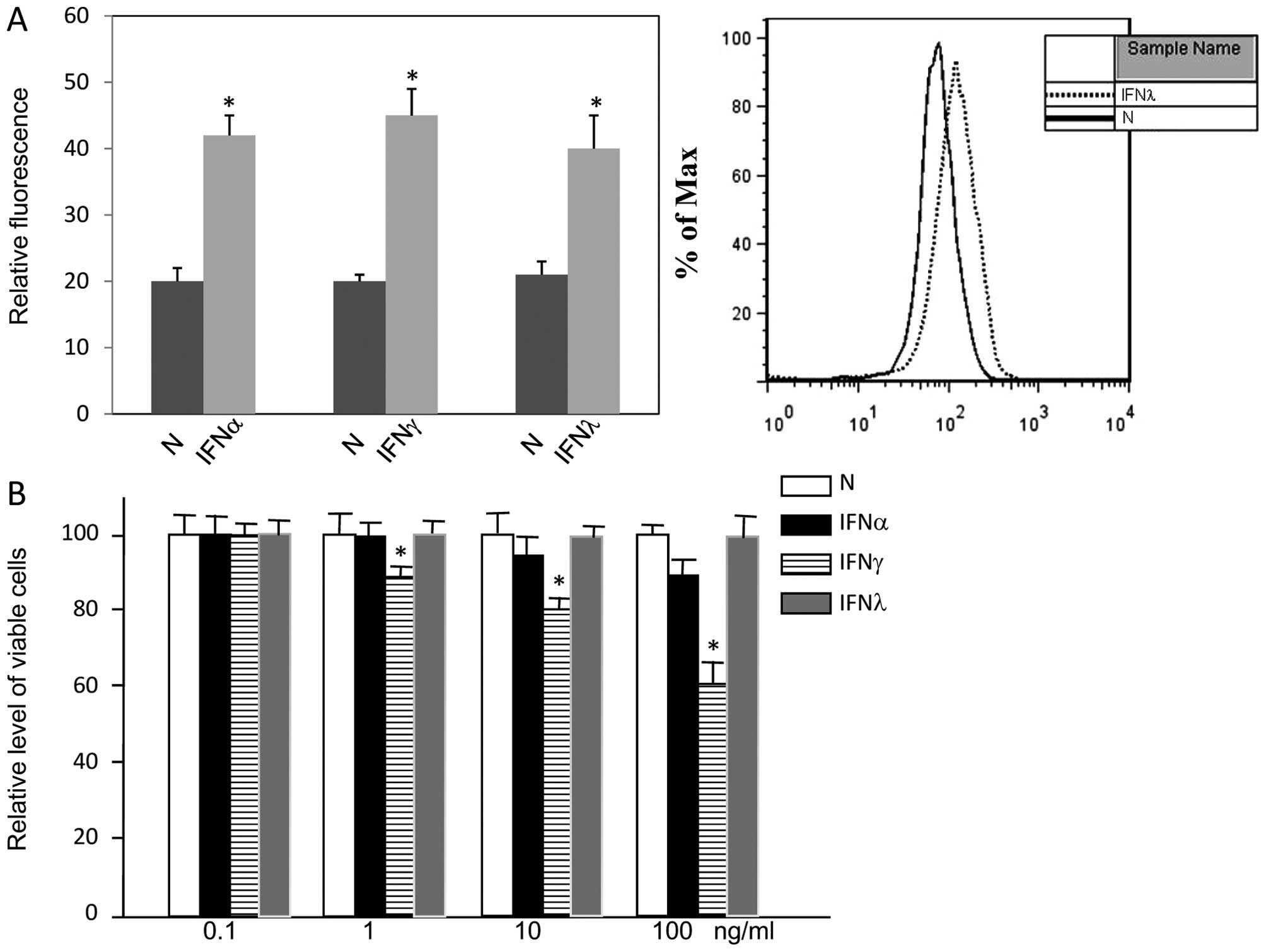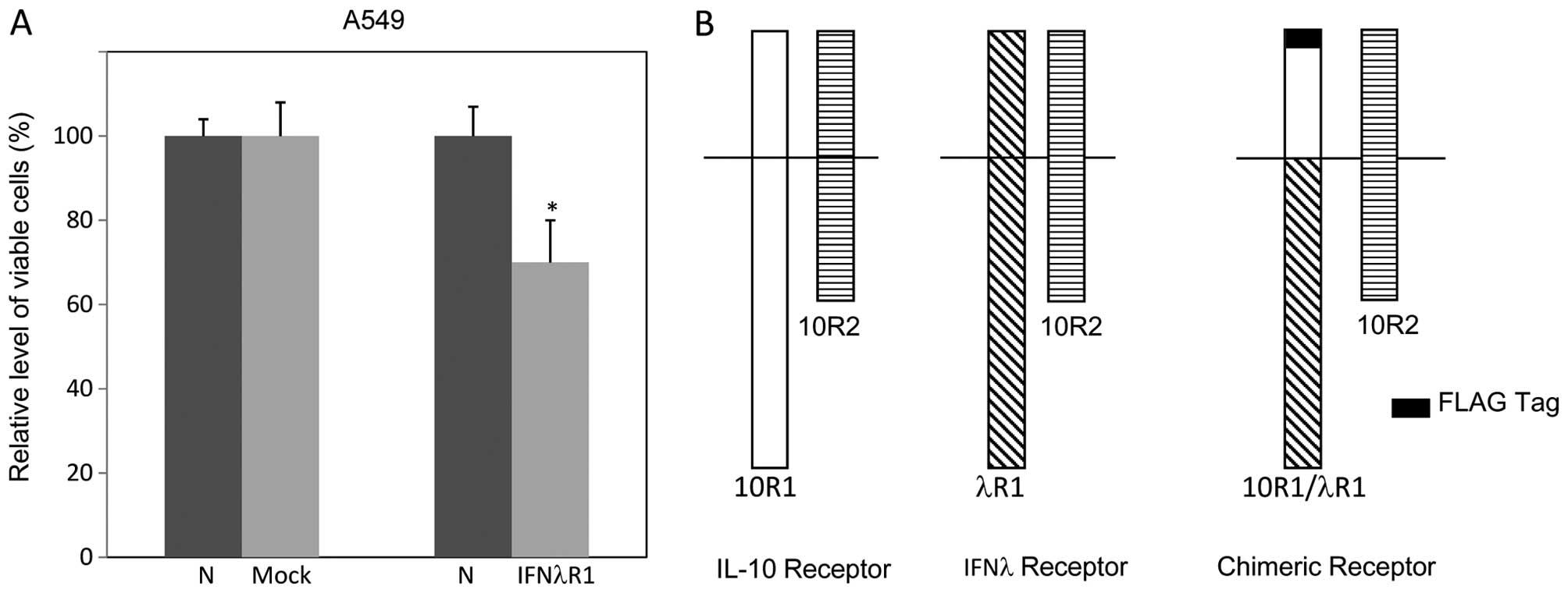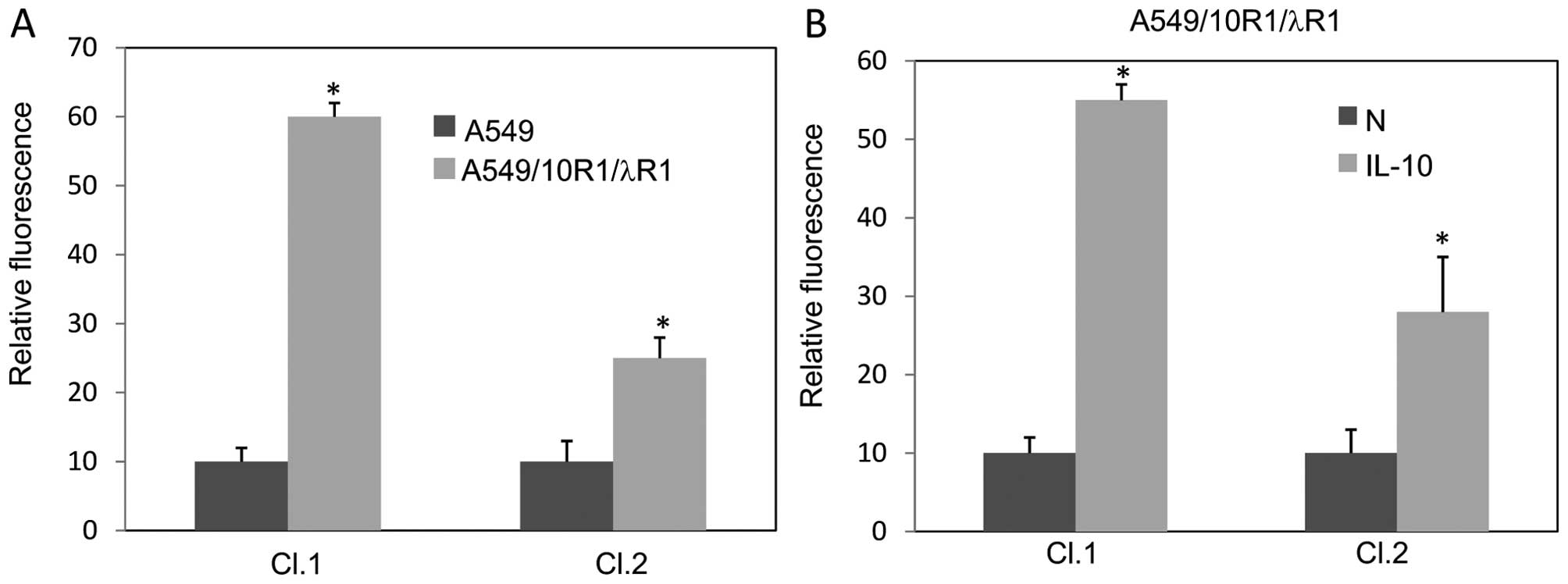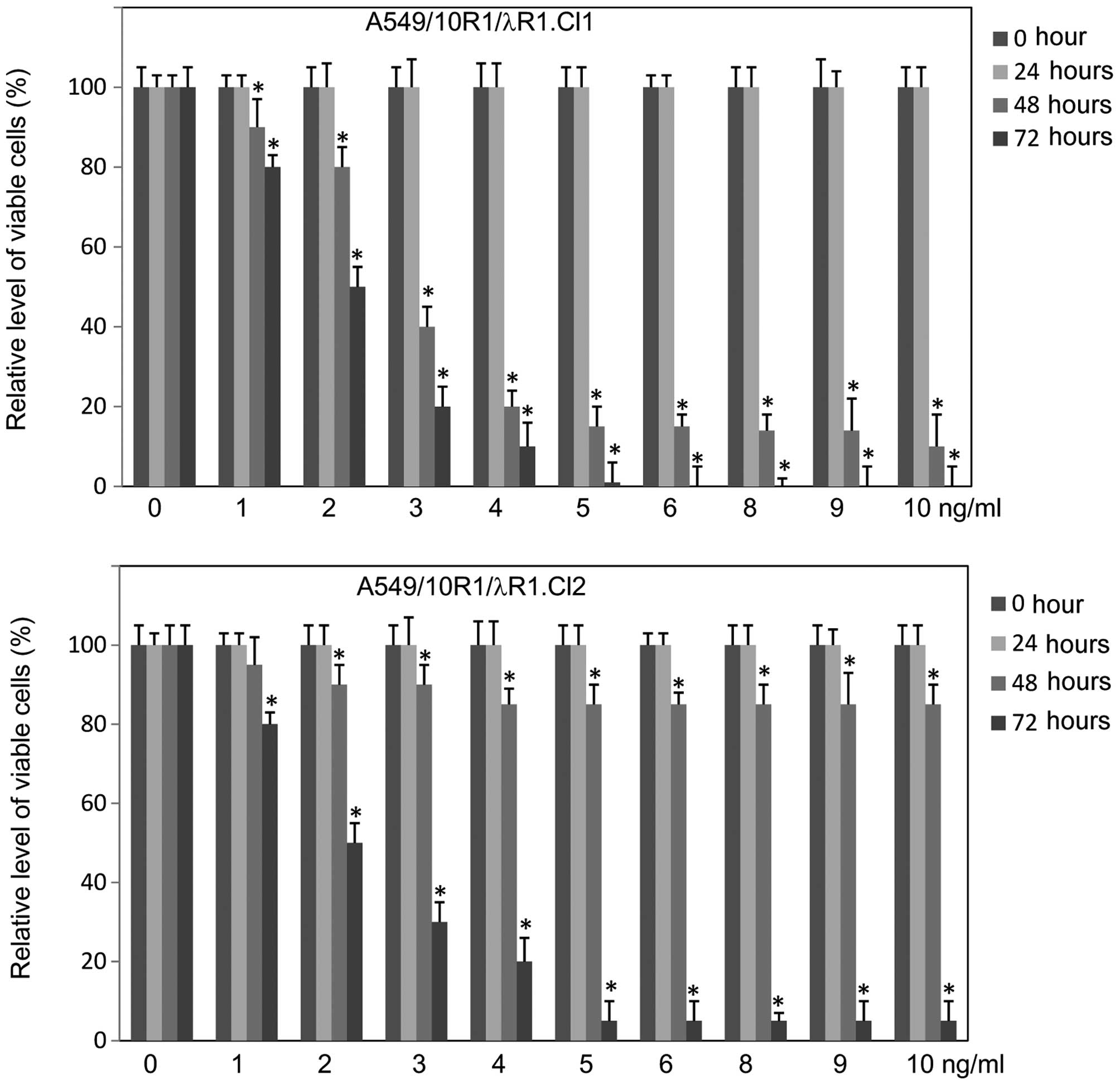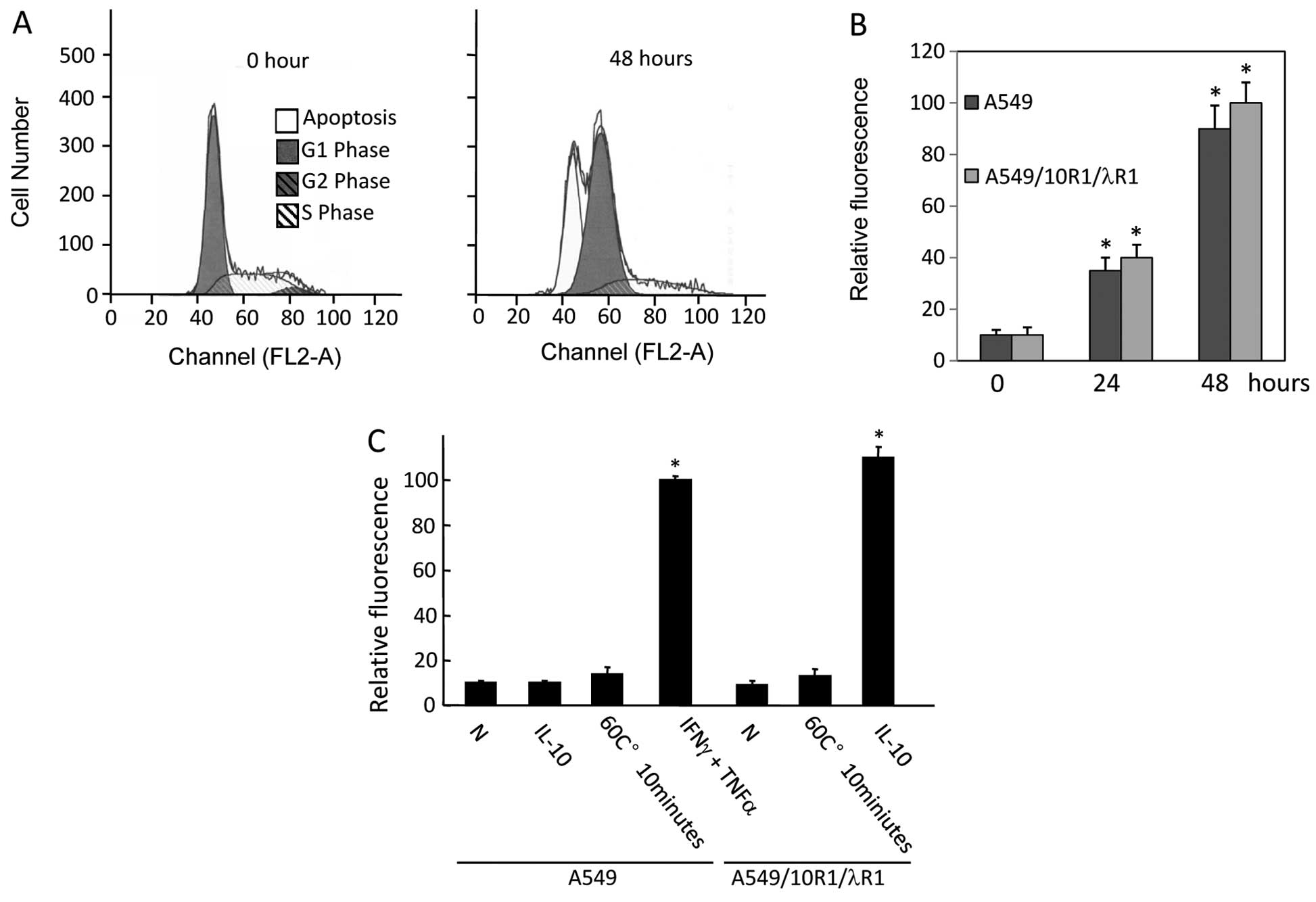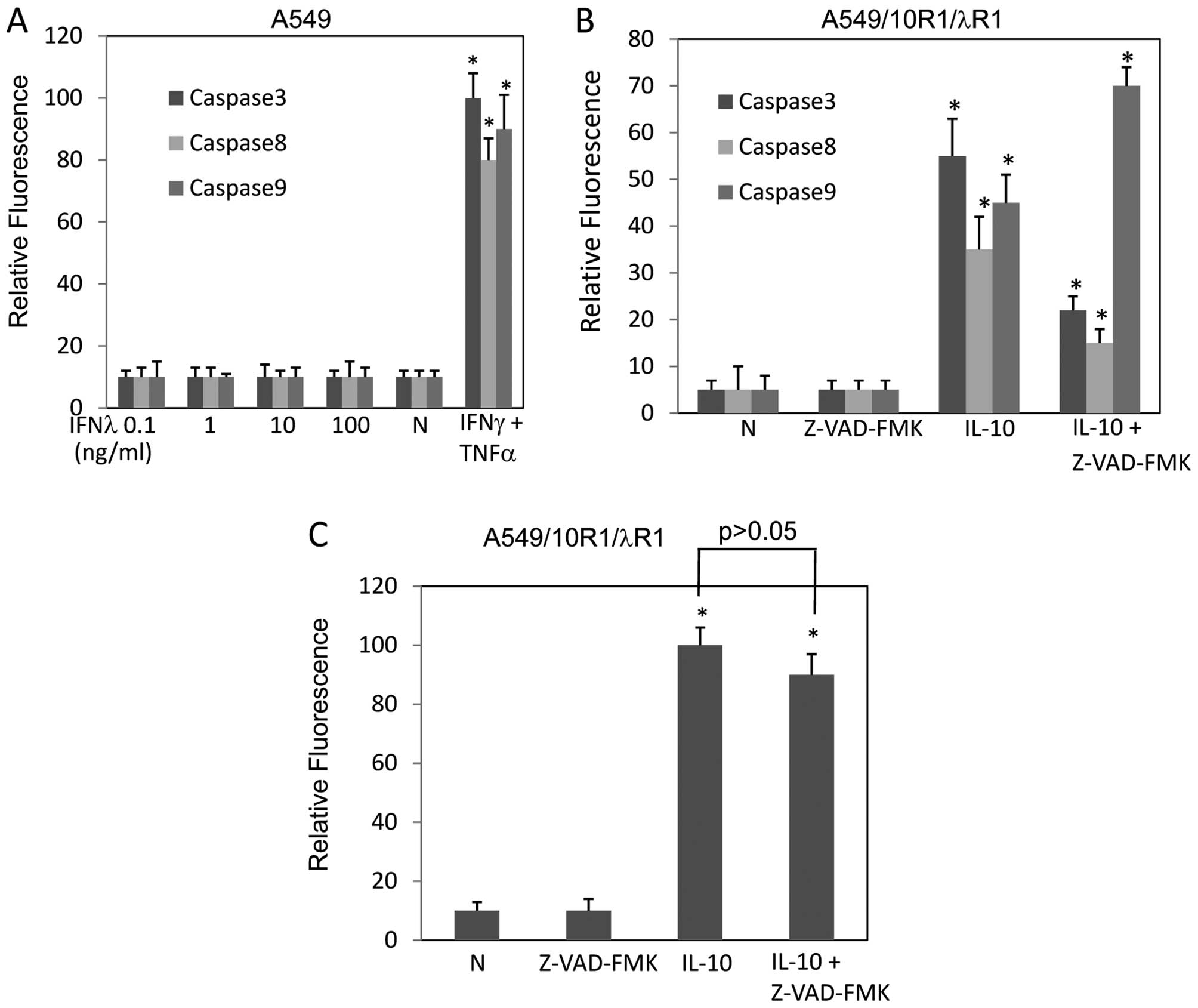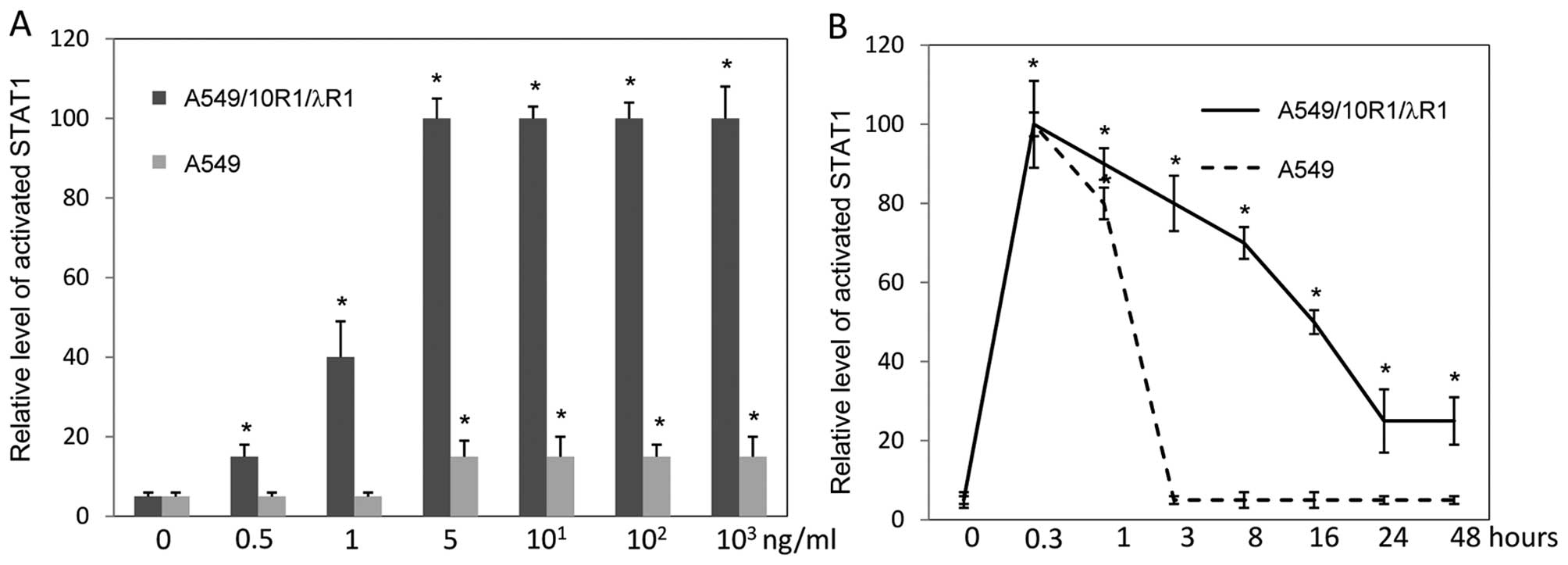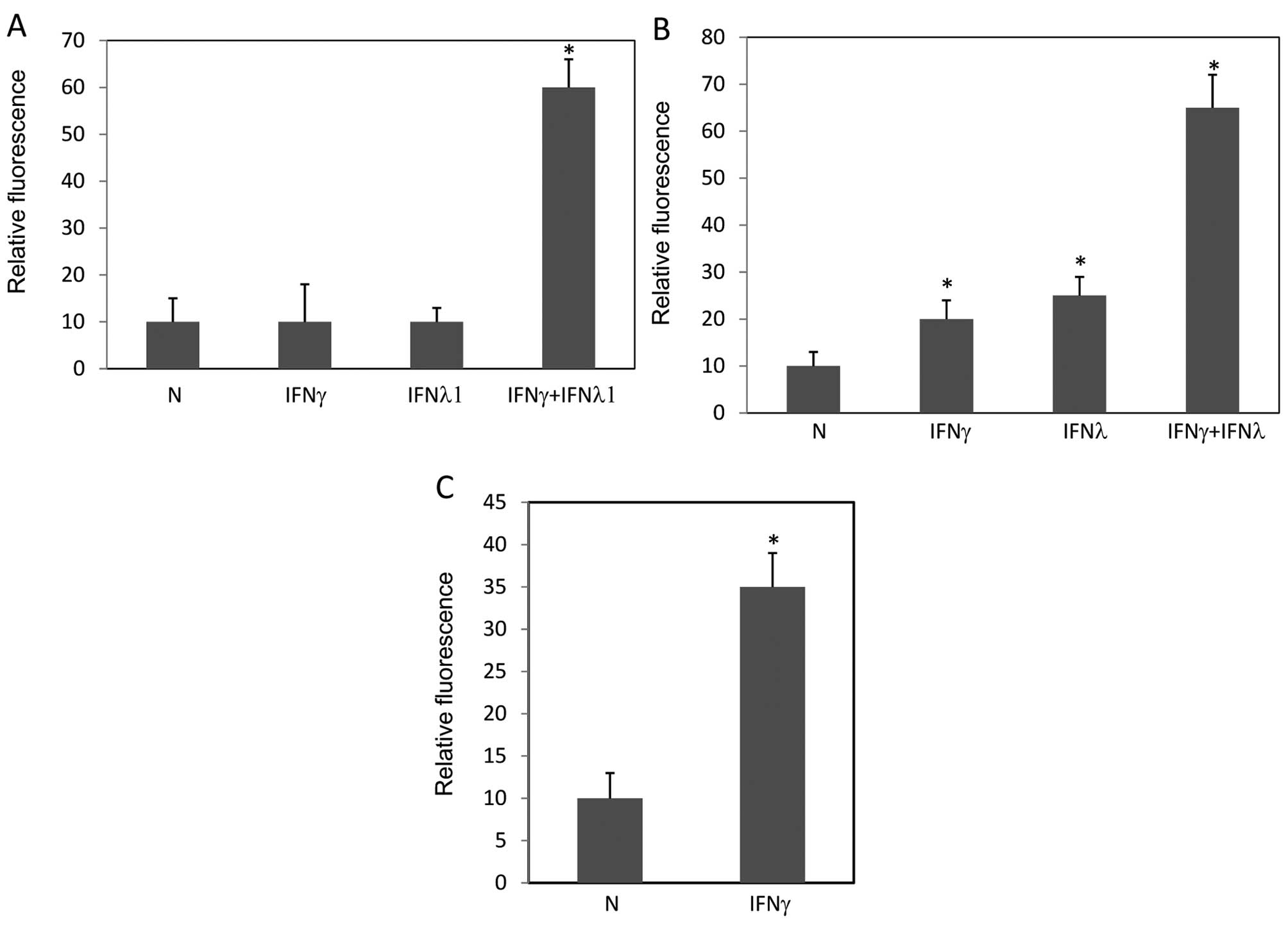|
1
|
Jemal A, Bray F, Center MM, Ferlay J, Ward
E and Forman D: Global cancer statistics. CA Cancer J Clin.
61:69–90. 2011. View Article : Google Scholar
|
|
2
|
Siegel R, Ward E, Brawley O and Jemal A:
Cancer statistics, 2011: the impact of eliminating socioeconomic
and racial disparities on premature cancer deaths. CA Cancer J
Clin. 61:212–236. 2011. View Article : Google Scholar : PubMed/NCBI
|
|
3
|
Chen W, Zhang S and Zou X: Estimation and
projection of lung cancer incidence and mortality in China.
Zhongguo Fei Ai Za Zhi. 13:488–493. 2010.(In Chinese).
|
|
4
|
Chinese Health Statistical Digest.
Ministry of Health; 2008, http://www.moh.gov.cn/publicfiles/business/htmlfiles/mohbgt/s8274/200805/35671.htm.
|
|
5
|
Clemens MJ: Interferons and apoptosis. J
Interferon Cytokine Res. 23:277–292. 2003. View Article : Google Scholar : PubMed/NCBI
|
|
6
|
Kotenko SV, Gallagher G, Baurin VV, et al:
IFN-lambdas mediate antiviral protection through a distinct class
II cytokine receptor complex. Nat Immunol. 4:69–77. 2003.
View Article : Google Scholar : PubMed/NCBI
|
|
7
|
Sheppard P, Kindsvogel W, Xu W, et al:
IL-28, IL-29 and their class II cytokine receptor IL-28R. Nat
Immunol. 4:63–68. 2003. View
Article : Google Scholar : PubMed/NCBI
|
|
8
|
Schindler C and Plumlee C: Inteferons pen
the JAK-STAT pathway. Semin Cell Dev Biol. 19:311–318. 2008.
View Article : Google Scholar : PubMed/NCBI
|
|
9
|
Renauld JC: Class II cytokine receptors
and their ligands: key antiviral and inflammatory modulators. Nat
Rev Immunol. 3:667–676. 2003. View
Article : Google Scholar : PubMed/NCBI
|
|
10
|
Platanias LC: Mechanisms of type-I- and
type-II-interferon-mediated signalling. Nat Rev Immunol. 5:375–386.
2005. View
Article : Google Scholar : PubMed/NCBI
|
|
11
|
Dunn GP, Bruce AT, Sheehan KC, et al: A
critical function for type I interferons in cancer immunoediting.
Nat Immunol. 6:722–729. 2005. View
Article : Google Scholar : PubMed/NCBI
|
|
12
|
Negro F: Adverse effects of drugs in the
treatment of viral hepatitis. Best Pract Res Clin Gastroenterol.
24:183–192. 2010. View Article : Google Scholar : PubMed/NCBI
|
|
13
|
Kelly C, Klenerman P and Barnes E:
Interferon lambdas: the next cytokine storm. Gut. 60:1284–1293.
2011. View Article : Google Scholar : PubMed/NCBI
|
|
14
|
Hanahan D and Weinberg RA: The hallmarks
of cancer. Cell. 100:57–70. 2000. View Article : Google Scholar
|
|
15
|
Borden EC: Review: Milstein Award lecture:
interferons and cancer: where from here? J Interferon Cytokine Res.
25:511–527. 2005. View Article : Google Scholar
|
|
16
|
Doyle SE, Schreckhise H, Khuu-Duong K, et
al: Interleukin-29 uses a type 1 interferon-like program to promote
antiviral responses in human hepatocytes. Hepatology. 44:896–906.
2006. View Article : Google Scholar : PubMed/NCBI
|
|
17
|
Marcello T, Grakoui A, Barba-Spaeth G, et
al: Interferons alpha and lambda inhibit hepatitis C virus
replication with distinct signal transduction and gene regulation
kinetics. Gastroenterology. 131:1887–1898. 2006. View Article : Google Scholar : PubMed/NCBI
|
|
18
|
Kalvakolanu DV: The GRIMs: a new interface
between cell death regulation and interferon/retinoid induced
growth suppression. Cytokine Growth Factor Rev. 15:169–194. 2004.
View Article : Google Scholar : PubMed/NCBI
|
|
19
|
Lasfar A, Lewis-Antes A, Smirnov SV, et
al: Characterization of the mouse IFN-lambda ligand-receptor
system: IFN-lambdas exhibit antitumor activity against B16
melanoma. Cancer Res. 66:4468–4477. 2006. View Article : Google Scholar : PubMed/NCBI
|
|
20
|
Numasaki M, Tagawa M, Iwata F, et al:
IL-28 elicits antitumor responses against murine fibrosarcoma. J
Immunol. 178:5086–5098. 2007. View Article : Google Scholar : PubMed/NCBI
|
|
21
|
Sato A, Ohtsuki M, Hata M, Kobayashi E and
Murakami T: Antitumor activity of IFN-lambda in murine tumor
models. J Immunol. 176:7686–7694. 2006. View Article : Google Scholar : PubMed/NCBI
|
|
22
|
Li W, Lewis-Antes A, Huang J, Balan M and
Kotenko SV: Regulation of apoptosis by type III interferons. Cell
Prolif. 41:960–979. 2008. View Article : Google Scholar : PubMed/NCBI
|
|
23
|
Meager A, Visvalingam K, Dilger P, Bryan D
and Wadhwa M: Biological activity of interleukins-28 and -29:
comparison with type I interferons. Cytokine. 31:109–118. 2005.
View Article : Google Scholar : PubMed/NCBI
|
|
24
|
Zitzmann K, Brand S, Baehs S, et al: Novel
interferon-lambdas induce antiproliferative effects in
neuroendocrine tumor cells. Biochem Biophys Res Commun.
344:1334–1341. 2006. View Article : Google Scholar : PubMed/NCBI
|
|
25
|
Brand S, Beigel F, Olszak T, et al: IL-28A
and IL-29 mediate antiproliferative and antiviral signals in
intestinal epithelial cells and murine CMV infection increases
colonic IL-28A expression. Am J Physiol Gastrointest Liver Physiol.
289:G960–G968. 2005. View Article : Google Scholar : PubMed/NCBI
|
|
26
|
Fujie H, Tanaka T, Tagawa M, et al:
Antitumor activity of type III interferon alone or in combination
with type I interferon against human non-small cell lung cancer.
Cancer Sci. 102:1977–1990. 2011. View Article : Google Scholar : PubMed/NCBI
|
|
27
|
Li W, Henderson LJ, Major EO and Al-Harthi
L: IFN-gamma mediates enhancement of HIV replication in astrocytes
by inducing an antagonist of the beta-catenin pathway (DKK1) in a
STAT 3-dependent manner. J Immunol. 186:6771–6778. 2011. View Article : Google Scholar : PubMed/NCBI
|
|
28
|
Dumoutier L, Tounsi A, Michiels T,
Sommereyns C, Kotenko SV and Renauld JC: Role of the interleukin
(IL)-28 receptor tyrosine residues for antiviral and
antiproliferative activity of IL-29/interferon-lambda 1:
similarities with type I interferon signaling. J Biol Chem.
279:32269–32274. 2004. View Article : Google Scholar
|
|
29
|
Kim KB, Choi YH, Kim IK, et al:
Potentiation of Fas- and TRAIL-mediated apoptosis by IFN-gamma in
A549 lung epithelial cells: enhancement of caspase-8 expression
through IFN-response element. Cytokine. 20:283–288. 2002.
View Article : Google Scholar : PubMed/NCBI
|
|
30
|
Shankaranarayanan P and Nigam S: IL-4
induces apoptosis in A549 lung adenocarcinoma cells: evidence for
the pivotal role of 15-hydroxyeicosatetraenoic acid binding to
activated peroxisome proliferator-activated receptor gamma
transcription factor. J Immunol. 170:887–894. 2003. View Article : Google Scholar
|
|
31
|
Improta T, Pine R and Pfeffer LM:
Interferon-gamma potentiates the antiviral activity and the
expression of interferon-stimulated genes induced by
interferon-alpha in U937 cells. J Interferon Res. 12:87–94. 1992.
View Article : Google Scholar : PubMed/NCBI
|
|
32
|
Levy DE, Lew DJ, Decker T, Kessler DS and
Darnell JE Jr: Synergistic interaction between interferon-alpha and
interferon-gamma through induced synthesis of one subunit of the
transcription factor ISGF3. EMBO J. 9:1105–1111. 1990.
|
|
33
|
Lehtonen A, Matikainen S and Julkunen I:
Interferons up-regulate STAT1, STAT2, and IRF family transcription
factor gene expression in human peripheral blood mononuclear cells
and macrophages. J Immunol. 159:794–803. 1997.PubMed/NCBI
|
|
34
|
Elmore S: Apoptosis: a review of
programmed cell death. Toxicol Pathol. 35:495–516. 2007. View Article : Google Scholar : PubMed/NCBI
|
|
35
|
Schattenberg JM, Schuchmann M and Galle
PR: Cell death and hepatocarcinogenesis: dysregulation of apoptosis
signaling pathways. J Gastroenterol Hepatol. 26(Suppl 1): 213–219.
2011. View Article : Google Scholar : PubMed/NCBI
|
|
36
|
Mihic LL, Bulat V, Situm M, Krolo I and
Seserko A: The role of apoptosis in the pathogenesis of malignant
melanoma. Coll Antropol. 34(Suppl 2): 303–306. 2010.
|















